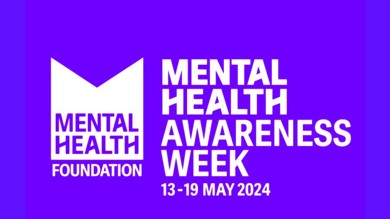
Mental Health Awareness Week: Supporting mental wellbeing among staff and students
Published: Monday 13 May 2024Myerscough College and University Centre is proud to support mental wellbeing among both staff and students.

At the start of Mental Health Week, Myerscough College continues its commitment by being part of a national mental health and wellbeing charter.
The charter, which was been created by the Association of Colleges, in conjunction with mental health experts, is an 11-point document, which includes commitments to:
- Promoting equality of opportunity and challenging mental health stigma
- Providing appropriate mental health training for staff
- Providing targeted individual mental health support where appropriate
Further reading:
Student support and welfare policy and procedure
Every year, 1 in 10 young people experience a mental health problem and 1 in 5 young people aged 16-24 experience a common mental illness such as anxiety or depression at any one time. Add to these facts, 75% of adults with a diagnosable mental health problem experience their first symptoms before the age of 24, meaning that Myerscough plays a vital role in supporting the mental health and wellbeing of its students and staff.
Alison Robinson, Chief Executive and Principal, said: “Every student and staff member deserve to work, study and train in an environment that supports them to be healthy, happy and secure.
‘’We take our commitment seriously and whilst we have a great track record, we are always keen to do more. Our students and staff can hold us to account as we continue to work together to support their health and wellbeing whilst they are with us.’’
The measures set out in the charter aim to help promote early intervention for those struggling with their mental health, and create a supportive environment, sending students and staff a clear message that if they are struggling with their mental health, support is available.
Our commit is to:
- Ensure that wellbeing and mental health work is led by a senior manager supported by a member of staff with particular responsibility for mental health
- Have a wellbeing and mental health policy accompanied by a clear implementation action plan which is monitored regularly and reviewed annually.
- Create an open and inclusive college ethos which includes respect for those with mental ill health.
- Promote equality of opportunity and challenging mental health stigma through curriculum teaching and also by promoting wellbeing through tutorial programmes
- Encourage and collect student views on mental health and wellbeing by working with the Students Union and other student representative bodies
- Provide appropriate mental health training for staff
- Ensure a consistent and positive approach to staff wellbeing
- Provide targeted individual mental health support where appropriate or alternatively signposting to external support services
- Provide relevant information to parents and carers
- Establish effective links with local health system and voluntary sector mental health providers
- Promote the benefit that physical activity and sport has on mental well-being
Myerscough also recognises that in the UK, people experiencing mental ill health continue to report stigma and discrimination at work.
Myerscough is committed to creating a supportive and open culture, where colleagues feel able to talk about mental health confidently and aspire to appropriately support the mental wellbeing of all staff.
As an employer, Myerscough has an on-going commitment to:
- Provide non-judgemental and proactive support to staff experiencing mental ill health.
- Not make assumptions about a person with a mental health condition and their ability to work.
- Be positive and enabling towards all employees and job applicants with a mental health condition.
- Support line managers in managing mental health in the workplace.
- Ensure we are fair in the recruitment of new staff in accordance with the Equality Act (2010).
- Make it clear that people who have experienced mental ill health will not be discriminated against, and that disclosure of a mental health problem will enable both the employee and employer to assess and provide the right level of support or adjustment.
